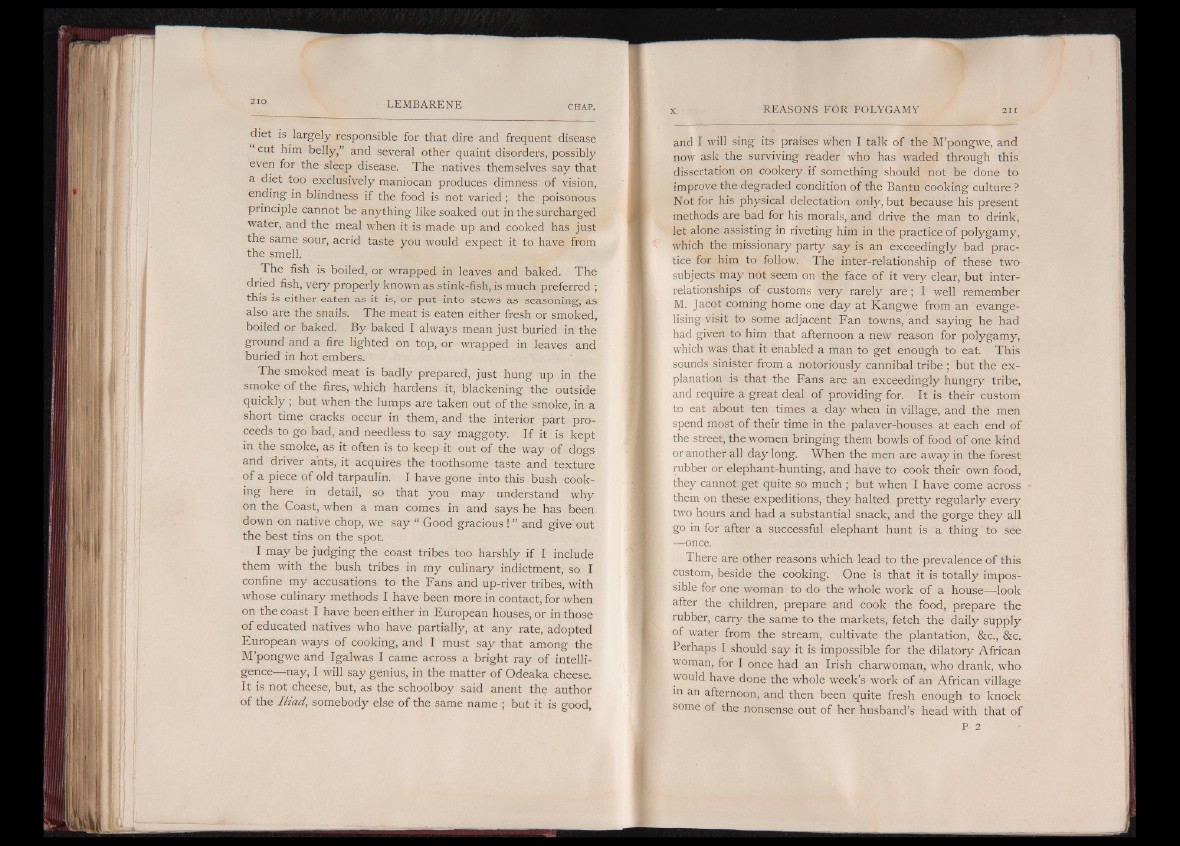
diet is largely responsible for that dire and frequent disease
cut him belly,” and several other quaint disorders, possibly
even for the sleep disease. The natives themselves say that
a diet too exclusively maniocan produces dimness of vision,
ending in blindness if the food is not varied ; the poisonous
principle cannot be anything like soaked out in the surcharged
water, and the meal when it is made up and cooked has just
the same sour, acrid taste you would expect it to have from
the smell.
The fish is boiled, or wrapped in leaves and baked. The
dried fish, very properly known as stink-fish, is much preferred ;
this is either eaten as it is, or put into stews as seasoning, as
also are the snails. The meat is eaten either fresh or smoked,
boiled or baked. By baked I always mean just buried in the
ground and a fire lighted on top, or wrapped in leaves and
buried in hot embers.
The smoked meat is badly prepared, just hung up in the
smoke of the fires, which hardens it, blackening the outside
quickly ; but when the lumps are taken out of the smoke, in a
short time cracks occur in them, and the interior part proceeds
to go bad, and needless to say maggoty. I f it is kept
in the smoke, as it often is to keep it out of the way o f dogs
and driver ants, it acquires the toothsome taste and texture
of a piece of old tarpaulin. I have gone into this bush cooking
here in detail, so that you may understand why
on the Coast, when a man comes in and says he has been
down on native chop, we say “ Good gracious ! ” and give out
the best tins on the spot.
I may be judging the coast tribes too harshly if I include
them with the bush tribes in my culinary indictment, so I
confine my accusations to the Fans and up-river tribes, with
whose culinary methods I have been more in contact, for when
on the coast I have been either in European houses, or in those
of educated natives who have partially, at any rate, adopted
European ways of cooking, and I must say that among the
M’pongwe and Igalwas I came across a bright ray of intelligence—
nay, I will say genius, in the matter of Odeaka cheese.
It is not cheese, but, as the schoolboy said anent the author
of the Iliad, somebody else of the same name ; but it is good,
and I will sing its praises when I talk of the M’pongwe, and
now ask the surviving reader who has waded through this,
dissertation on cookery if something should not be done to
improve the degraded condition of the Bantu cooking culture ?
Not for his physical delectation only, but because his present
methods are bad for his morals, and drive the man to drink,
let alone assisting in riveting him in the practice of polygamy,
which the missionary party say is an exceedingly bad practice
for him to follow. The inter-relationship of these two
subjects may not seem on the face of it very clear, but interrelationships
of customs very rarely a re ; I well remember
M. Jacot coming home one day at Kangwe from an evangelising
visit to some adjacent Fan towns/and saying he had
had given to him that afternoon a new reason for polygamy,
which was that it enabled a man to get enough to eat. This
sounds sinister from a notoriously cannibal tribe ; but the explanation
is that the Fans are an exceedingly hungry tribe,
and require a great deal of providing for. It is their custom
to eat about ten times a day when in village, and the men
spend most of their time in the palaver-houses at each end o f
the street, the women bringing them bowls of food of one kind
or another all day long. When the men are away in the forest
rubber or elephant-hunting, and have to cook their own food,
they cannot get quite so much; but when I have come across
them on these expeditions, they halted pretty regularly every
two hours and had a substantial snack, and the gorge they all
go in for after a successful elephant hunt is a thing to see
— once.
There are other reasons which lead to the prevalence of this
custom, beside the cooking. One is that it is totally impossible
for one woman to do the whole work of a house— look
after the children, prepare and cook the food, prepare the
rubber, carry the same to the markets, fetch the daily supply
of water from the stream, cultivate the plantation, &c., &c.
Perhaps I should say it is impossible for the dilatory African
woman, for I once had an Irish charwoman, who drank, who
would have done the whole week’s work of an African village
in an afternoon, and then been quite fresh enough to knock
some of the nonsense out of her husband’s head with that of
P 2